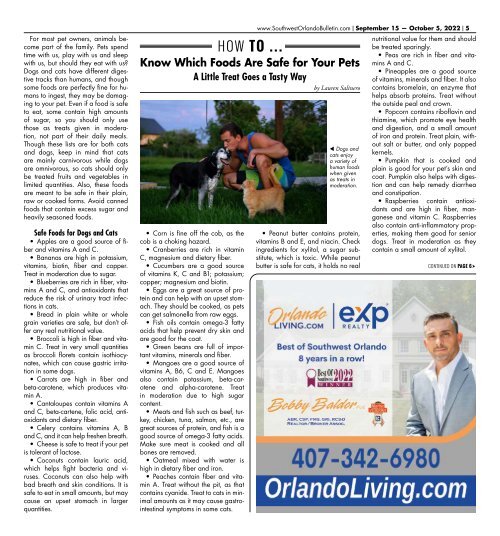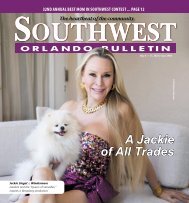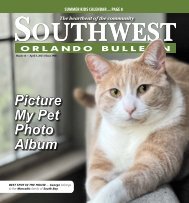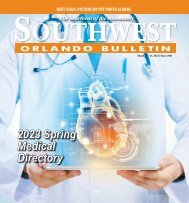091522_SW_Taste The Town_DIGITAL EDITION
You also want an ePaper? Increase the reach of your titles
YUMPU automatically turns print PDFs into web optimized ePapers that Google loves.
For most pet owners, animals become<br />
part of the family. Pets spend<br />
time with us, play with us and sleep<br />
with us, but should they eat with us?<br />
Dogs and cats have different digestive<br />
tracks than humans, and though<br />
some foods are perfectly fine for humans<br />
to ingest, they may be damaging<br />
to your pet. Even if a food is safe<br />
to eat, some contain high amounts<br />
of sugar, so you should only use<br />
those as treats given in moderation,<br />
not part of their daily meals.<br />
Though these lists are for both cats<br />
and dogs, keep in mind that cats<br />
are mainly carnivorous while dogs<br />
are omnivorous, so cats should only<br />
be treated fruits and vegetables in<br />
limited quantities. Also, these foods<br />
are meant to be safe in their plain,<br />
raw or cooked forms. Avoid canned<br />
foods that contain excess sugar and<br />
heavily seasoned foods.<br />
Safe Foods for Dogs and Cats<br />
• Apples are a good source of fiber<br />
and vitamins A and C.<br />
• Bananas are high in potassium,<br />
vitamins, biotin, fiber and copper.<br />
Treat in moderation due to sugar.<br />
• Blueberries are rich in fiber, vitamins<br />
A and C, and antioxidants that<br />
reduce the risk of urinary tract infections<br />
in cats.<br />
• Bread in plain white or whole<br />
grain varieties are safe, but don’t offer<br />
any real nutritional value.<br />
• Broccoli is high in fiber and vitamin<br />
C. Treat in very small quantities<br />
as broccoli florets contain isothiocynates,<br />
which can cause gastric irritation<br />
in some dogs.<br />
• Carrots are high in fiber and<br />
beta-carotene, which produces vitamin<br />
A.<br />
• Cantaloupes contain vitamins A<br />
and C, beta-cartene, folic acid, antioxidants<br />
and dietary fiber.<br />
• Celery contains vitamins A, B<br />
and C, and it can help freshen breath.<br />
• Cheese is safe to treat if your pet<br />
is tolerant of lactose.<br />
• Coconuts contain lauric acid,<br />
which helps fight bacteria and viruses.<br />
Coconuts can also help with<br />
bad breath and skin conditions. It is<br />
safe to eat in small amounts, but may<br />
cause an upset stomach in larger<br />
quantities.<br />
HOW<br />
• Corn is fine off the cob, as the<br />
cob is a choking hazard.<br />
• Cranberries are rich in vitamin<br />
C, magnesium and dietary fiber.<br />
• Cucumbers are a good source<br />
of vitamins K, C and B1; potassium;<br />
copper; magnesium and biotin.<br />
• Eggs are a great source of protein<br />
and can help with an upset stomach.<br />
<strong>The</strong>y should be cooked, as pets<br />
can get salmonella from raw eggs.<br />
• Fish oils contain omega-3 fatty<br />
acids that help prevent dry skin and<br />
are good for the coat.<br />
• Green beans are full of important<br />
vitamins, minerals and fiber.<br />
• Mangoes are a good source of<br />
vitamins A, B6, C and E. Mangoes<br />
also contain potassium, beta-carotene<br />
and alpha-carotene. Treat<br />
in moderation due to high sugar<br />
content.<br />
• Meats and fish such as beef, turkey,<br />
chicken, tuna, salmon, etc., are<br />
great sources of protein, and fish is a<br />
good source of omega-3 fatty acids.<br />
Make sure meat is cooked and all<br />
bones are removed.<br />
• Oatmeal mixed with water is<br />
high in dietary fiber and iron.<br />
• Peaches contain fiber and vitamin<br />
A. Treat without the pit, as that<br />
contains cyanide. Treat to cats in minimal<br />
amounts as it may cause gastrointestinal<br />
symptoms in some cats.<br />
www.SouthwestOrlandoBulletin.com x September 15 — October 5, 2022 x 5<br />
TO ...<br />
Know Which Foods Are Safe for Your Pets<br />
A Little Treat Goes a Tasty Way<br />
by Lauren Salinero<br />
Dogs and<br />
cats enjoy<br />
a variety of<br />
human foods<br />
when given<br />
as treats in<br />
moderation.<br />
• Peanut butter contains protein,<br />
vitamins B and E, and niacin. Check<br />
ingredients for xylitol, a sugar substitute,<br />
which is toxic. While peanut<br />
butter is safe for cats, it holds no real<br />
nutritional value for them and should<br />
be treated sparingly.<br />
• Peas are rich in fiber and vitamins<br />
A and C.<br />
• Pineapples are a good source<br />
of vitamins, minerals and fiber. It also<br />
contains bromelain, an enzyme that<br />
helps absorb proteins. Treat without<br />
the outside peal and crown.<br />
• Popcorn contains riboflavin and<br />
thiamine, which promote eye health<br />
and digestion, and a small amount<br />
of iron and protein. Treat plain, without<br />
salt or butter, and only popped<br />
kernels.<br />
• Pumpkin that is cooked and<br />
plain is good for your pet’s skin and<br />
coat. Pumpkin also helps with digestion<br />
and can help remedy diarrhea<br />
and constipation.<br />
• Raspberries contain antioxidants<br />
and are high in fiber, manganese<br />
and vitamin C. Raspberries<br />
also contain anti-inflammatory properties,<br />
making them good for senior<br />
dogs. Treat in moderation as they<br />
contain a small amount of xylitol.<br />
CONTINUED ON PAGE 6

















